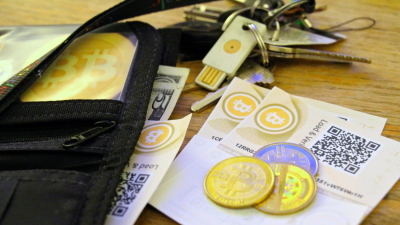 Bitcoin is one of the most popular digital currencies on the market. It is a form of cryptocurrency that is a decentralized method of payment using a technology called blockchain.
Bitcoin is one of the most popular digital currencies on the market. It is a form of cryptocurrency that is a decentralized method of payment using a technology called blockchain.
Blockchain makes your currency more secure and democratized, which means Bitcoin has private keys that store your address to remain anonymous. Your public keys are for receiving transactions, and they change every time you make a new transaction. These private keys are stored securely in the wallet.
This article will explain what a cryptocurrency wallet is, how it works, and which wallets are considered the best.
Content:
- Cryptocurrency wallet - what is it?
- What cryptocurrency wallets are there?
- Hardware wallets
- Desktop wallets
- Mobile wallets
- Online wallets
- Paper wallets
- Why are hardware wallets the best for storing cryptocurrencies and Bitcoin?
- Using a hardware wallet
- Conclusion
Cryptocurrency wallet - what is it?
 There are different types of Bitcoin wallets, but they all store a person’s private keys. Some do it online, others offline.
There are different types of Bitcoin wallets, but they all store a person’s private keys. Some do it online, others offline.
Instead of a digital wallet, there is also a hardware wallet - this is a physical object that can look like a USB drive or an external hard drive. Its main role is to store your private keys, and it is actually the most secure way to store your cryptocurrency.
Hardware wallets are protected from any computer viruses. Your money will be stored securely in a hardware wallet, and it's the perfect way to store your Bitcoins in a portable and affordable way.
What cryptocurrency wallets are there?
There are five main types of wallets:
- Hardware
- Tabletop
- Mobile
- Online
- Paper
Hardware wallets
These are wallets that store your private keys on devices such as USB drives. Hardware wallets are also called cold wallets, and they are extremely secure. Therefore, it is recommended to only purchase them if you plan to store large amounts of crypto assets for a long time.
Popular Bitcoin hardware wallets include the following devices:
- Ledger
- Trezor
- KeepKey
- BitLox
Desktop wallets
 Desktop wallets are installed on personal computers or laptops. If a device is constantly connected to the Internet, it is classified as hot. They are generally considered safe, but they are vulnerable to various malware and computer viruses. These wallets include:
Desktop wallets are installed on personal computers or laptops. If a device is constantly connected to the Internet, it is classified as hot. They are generally considered safe, but they are vulnerable to various malware and computer viruses. These wallets include:
- Electrum
- Jaxx
- Exodus
- Wasabi Wallet
Mobile wallets
Mobile wallets, like desktop wallets, are software wallets. Unlike desktop ones, they are much smaller and simpler and can be installed on a tablet or smartphone. These wallets are most suitable for daily use. Most Popular:
- Jaxx
- Breadwallet
- Exodus
- Electrum
- SamouraiWallet
- MyCelium
Online wallets
These are wallets that are considered less secure than other types of wallets, but they can be very convenient. Web wallets include browser plugins, website wallets, and exchange wallets. Popular ones are:
- Coinbase
- Guarda
- GreenAddress
- Binance
- Xapo
- Rahakott
- Exmo
Paper wallets
 Paper wallets are cold. A wallet is called a paper wallet because that is what it is in the literal sense of the word. You generate an address for your Bitcoins and receive a file that you can then print. You can leave it in electronic form, but you should not store it on third-party resources, as they can be hacked and your funds stolen.
Paper wallets are cold. A wallet is called a paper wallet because that is what it is in the literal sense of the word. You generate an address for your Bitcoins and receive a file that you can then print. You can leave it in electronic form, but you should not store it on third-party resources, as they can be hacked and your funds stolen.
Paper wallets can provide you with a relatively high level of security. You can use Bitcoin Paper Wallet Generator to generate a paper wallet for Bitcoin.
If you decide to use a paper wallet, do not forget that there is a very high risk that it may deteriorate from water, fire and any other physical factors. Such wallets should be stored in a safe place, such as a safe.
Why are hardware wallets the best for storing cryptocurrencies and Bitcoin?
Hardware technology has two main advantages:
- Independence
- Offline storage
By owning a hardware wallet, you are the only one who knows the private keys, which means you will be the only one who can access your money.
By using a wallet, your private key remains in your hands. Meanwhile, online wallets require you to store your keys on a third-party service.
The largest cryptocurrency exchanges have significant security, but there is always a small risk that your private key could be compromised when listed on an online exchange. By keeping your keys in an offline wallet, you add an extra layer of protection and security to yourself.
Standalone hardware wallets also provide protection against viruses and third-party programs. Even if you connect to the Internet or any other computer with viruses, you will not lose your funds, because hardware wallets do not work to receive data. They can only send them.
And most importantly, hardware wallets are 100% protected from cyber attacks and hackers because they simply do not have access to them. The same cannot be said for cryptocurrency exchanges, which are regularly hacked despite spending millions of dollars to improve security. Many people have lost their money forever by storing it on the stock exchange.
Using a hardware wallet
 Different hardware wallets have different features, but the essence is basically the same. You connect your hardware wallet to your computer and use the buttons on the device to navigate through the menus and confirm your selections.
Different hardware wallets have different features, but the essence is basically the same. You connect your hardware wallet to your computer and use the buttons on the device to navigate through the menus and confirm your selections.
When you first connect, you will set a PIN code to log in.
During setup, you will receive a SEED phrase to restore your wallet if it malfunctions or is lost. The phrase length is 24 words. It is imperative that you write it down, because it is what gives you access to everything. If you ever lose your wallet, you can purchase a new one, enter a phrase of these 24 words and restore all your funds.
Cryptocurrency transfers are carried out using a computer or laptop with a connected wallet.
Conclusion
Now you know what methods you can use to store funds in cryptocurrency. If you do not have a large amount, then you can keep it on any exchange, but it is better to store large amounts in your own wallets. If you choose a hardware wallet, always write down your passwords and secret phrases on paper, because if you lose your phrase, you will never be able to regain access to your funds.
See also:



To leave a comment, you must register or log in to your account.